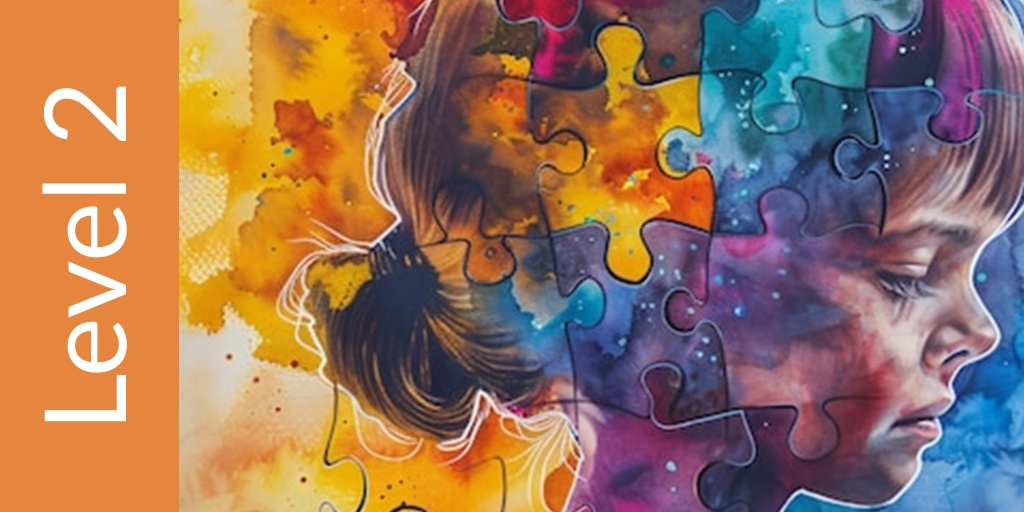Certificate in cognitive behaviour therapy (CBT) for children level 2: Clinical applications to specific cases

Gain advanced, evidence-based techniques to support children and adolescents with complex mental health needs. This advanced CBT training deepens your skills in addressing anxiety, depression, OCD, school avoidance, and other clinical challenges through practical, developmentally informed strategies.
This 5-day cognitive behavioural therapy (CBT) for children advanced training is designed for professionals seeking to deepen their expertise in CBT for children and adolescents. The series focuses on practical, clinically relevant applications, equipping participants with the advanced skills needed to address a range of complex issues faced by children and youth today. Clinicians will learn variable, evidence-based techniques that can be immediately applied in their practice.
Covering topics such as anxiety, depression, OCD, and school avoidance, this CBT for children advanced training provides a comprehensive skillset to tackle various mental health challenges in children and adolescents. Whether you’re looking to expand your current practice or specialize in these areas, this certificate program offers the tools and frameworks needed to deliver effective, evidence-based care.
This program is offered as an open module series, allowing the flexibility to register for any of the five individual modules or the entire series, depending on your learning objectives. Whether you choose to join one module or all five, this series aims to provide valuable insights and practical tools for professionals looking to support a diverse spectrum of mental health challenges and cases. To receive the Certificate in CBT for children level 2, participants must attend all five modules.
Join us for this dynamic training and expand your ability to support children and families with evidence-based, practical therapeutic interventions.
Individual modules include:
Module 1: Using inhibitory learning and exposure-based approaches for child anxiety
When: February 19, 2026 | 9 a.m. to 4 p.m. ET
Facilitator(s): Daniel Chorney, Ph.D.
Learn advanced exposure-based techniques to effectively treat child anxiety. This module focuses on inhibitory learning to build resilience and improve functioning in children with anxiety disorders.
Learning objectives:
- Understand the foundations of exposure therapy.
- Integrate flexible approaches to CBT.
- Address ethical considerations in exposure therapy.
- Apply advanced exposure strategies.
- Develop and implement exposure hierarchies.
Module 2: Cognitive behaviour therapy (CBT) for depression in youth
When: February 26, 2026 | 9 a.m. to 4 p.m. ET
Facilitator(s): Kathryn Walker, Ph.D., C.Psych.
Gain practical tools for treating adolescent depression using CBT. Focus on reversing the ‘downward cycle’ of depression and empowering teens with strategies to break negative thought patterns.
Learning objectives:
- Identify common triggers for onset of depression in adolescence.
- Learn and practice key cognitive, emotional and behavioural strategies to draw on when clients describe depression, to support them to break their TFB cycles.
- Learn key strategies to help parents/caregivers to support their youth who experience depression, and to avoid unhelpful reinforcement patterns.
- Learn key strategies to build resilience and prevent relapse of depression for adolescents.
Module 3: Cognitive behaviour therapy (CBT) and exposure and response prevention for paediatric obsessive-compulsive disorder (OCD)
When: March 5, 2026 | 9 a.m. to 4 p.m. ET
Facilitator(s): Daniel Chorney, Ph.D.
Master exposure and response prevention (ERP) techniques for treating pediatric OCD. Learn how to create effective exposure hierarchies and manage complex OCD presentations in children and teens.
Learning objectives:
- Comprehend the core features and assessment of paediatric OCD.
- Effectively apply exposure and response prevention (ERP).
- Address common challenges in paediatric OCD treatment.
- Manage varieties of OCD presentations.
- Enhance treatment outcomes and prevent relapse.
Module 4: Cognitive behaviour therapy (CBT) for children with pain, somatization, or medical concerns.
When: March 12, 2026 | 9 a.m. to 4 p.m. ET
Facilitator(s): Kathryn Walker, Ph.D., C.Psych.
Explore CBT strategies for children dealing with chronic pain or medical issues. Learn how to apply the TFB cycle and acceptance and commitment therapy (ACT) principles to improve mental and physical well-being.
Learning objectives:
- Identify when physical health and mental health symptoms may be presenting and cycling for children and adolescents.
- Learn key cognitive, emotional and behavioural strategies to draw on when clients describe pain or other physical/medical symptoms, to support them to break their TFB cycles.
- Learn when acceptance and commitment therapy (ACT) strategies may be particularly helpful for certain medical presentations.
- Apply key ACT strategies with their clients to support them to live well even when chronic pain or medical symptoms will be ongoing.
Module 5: Emotionally-based school avoidance: A multi-systemic cognitive behaviour therapy (CBT) approach to problematic attendance
When: March 26, 2026 | 9 a.m. to 4 p.m. ET
Facilitator(s): Daniel Chorney, Ph.D.
Tackle emotionally-based school avoidance with a multi-systemic approach. Learn to assess the four core functions of school avoidance, help children who are starting to refuse school, and methods to help prevent school refusal behaviors using evidence-based CBT strategies tailored to individual needs.
Learning objectives:
- Understand the complexities of emotionally-based school avoidance (EBSA).
- Assess and identify the underlying causes of school refusal.
- Implement effective, evidence-based interventions.
- Develop and apply a multi-tiered model of support.
- Engage parents and school staff in a collaborative process.
Register now to enhance your clinical skills and confidently tackle anxiety, depression, OCD, and more, with proven CBT methods that will immediately benefit your practice and your young clients.
Please note: This is a five-module certificate program. You must complete all five modules within a year to obtain the certificate. Each of the modules may be taken on their own as a stand-alone training.



